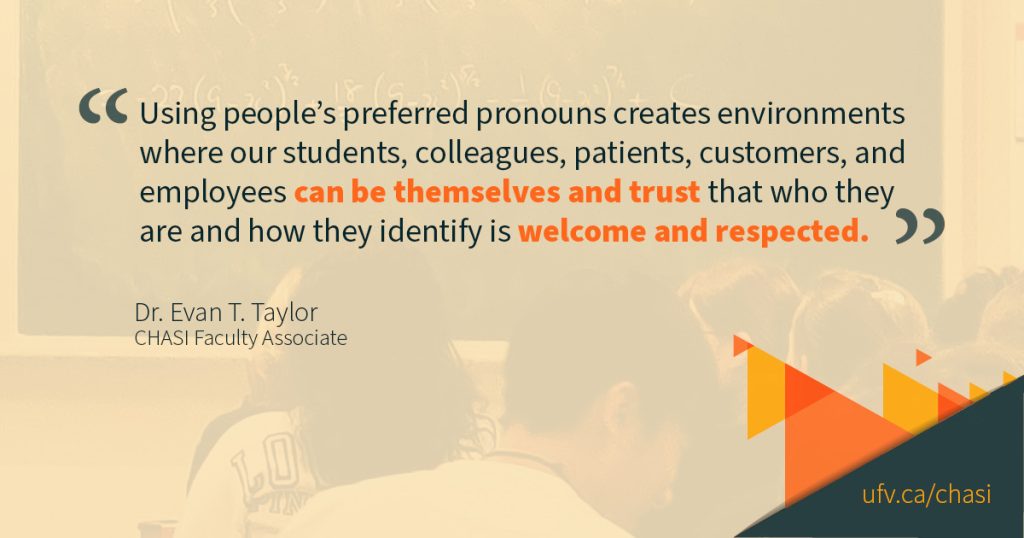This guest post for International Pronouns Day was generously provided by CHASI Faculty Associate Dr. Evan T. Taylor from UFV’s School of Social Work & Human Services.
October 20th is International Pronouns Day – a day started in 2018 by an organization of grassroots volunteers and taking place on the 3rd Wednesday of each October.
While undoubtedly pronouns are a key part of language and how it is that we communicate and recognize each other, language is not always our friend. Language, and particularly gendered language, is the mechanism by which we move and recognize power structures. Language is problematic, not perfect in its representation, and has constraints of culture, identity, and recognition.

But, along with its limitations and misuses, making sure to ask and use the correct pronouns in professional settings where we are providing service to others is key in creating more accessible and equitable professional and institutional environments. We might be talking about medical settings where providers can ask the right questions to understand who their patients are and how their patients’ identities and social locations impact their health. Or we might be talking about a business setting that needs to ensure social sustainability and a strong and diverse customer base. Perhaps we are talking about historical representations in public libraries and the colonial imposition of metadata organizational systems that obscures gender diversity in Indigenous cultures. Or maybe teachers and educators in elementary schools who want to prevent gender-based bullying. Perhaps we are meeting a new colleague in our faculty or department and are introducing ourselves, or maybe we are on a Zoom call and we can add our pronouns to our profiles and make sure to look for and use other people’s identified pronouns.
Here at UFV, we deal with all of these situations in one department or another because we are not only colleagues working alongside each other to cultivate and model diverse and respectful working environments, but we are also educating our students to be prepared and successful graduates in various types of settings: medical environments, business and commerce, libraries, schools, airports, community agencies, and so many more. Asking about pronouns, and then respecting and using people’s preferred pronouns creates environments where our students, colleagues, patients, customers, and employees can be themselves and trust that who they are and how they identify is welcome and respected. In our classrooms, we are helping students to learn about their future careers, and they need to be able to bring their whole selves into the classroom to be able to learn. While it’s a very simple thing, asking about and using people’s preferred pronouns has the profound effect of creating more welcoming environments that have more awareness of the diversities of gender identity and expression, which is beneficial not only for transgender and non-binary people, but for everyone.
For more information on pronoun use, visit www.nbdcampaign.ca.

